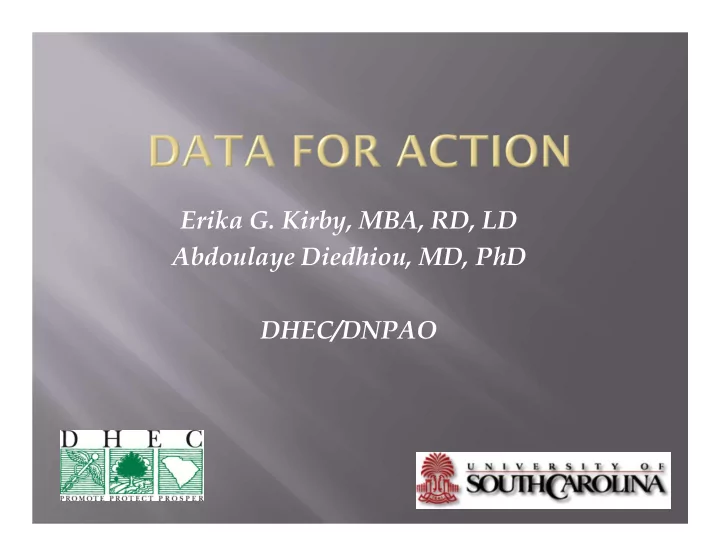

Erika G. Kirby, MBA, RD, LD Abdoulaye Diedhiou, MD, PhD DHEC/DNPAO
Teresa Hill Jill Pfankuch Joann Minder Kristian Gordon Mary Kay Face Khosrow Heidari
M M oving South Carolina oving South Carolina M M oving South Carolina oving South Carolina Tow Tow ards a Healthy W ards a Healthy W eight: eight: Tow Tow ards a Healthy W ards a Healthy W eight: eight: Prom Prom oting oting Healthy Healthy Lifestyles and Lifestyles and Healthy Healthy C C om om m m unities unities
Developed and launched…. years ago Prevent and control obesity and other chronic diseases through healthy eating and physical activity Behavior-oriented: Decreased prevalence of obesity and chronic diseases Increased physical activity Improved dietary behaviors
Purpose Increased number, reach, and quality of policies and standards supportive of healthy eating and active living (HEAL) in various settings Increased access to and use of environments supportive of HEAL in various settings Increased number, reach, quality of social and behavioral approaches that promote HEAL
Raising public awareness and mobilizing additional partners in support of prevention efforts Immediate public health action : data used for priority setting and policymaking program planning and evaluation Tracking progress toward meeting objectives of the Obesity State plan & OFA
Support and develop capacity for surveillance to monitor State Obesity Plan : Processes: implementation of behavioral, and policy & environmental interventions Impacts: change in overweight and obesity related behaviors, including nutrition quality and physical activity Outcomes: prevalence of overweight, obesity, and related chronic diseases
Various levels of the Socio-Ecological model Individual level BMI (adults); BMI-for-age (children age 2 and older) Physical activity and nutrition behaviors Obesity-related health conditions Academic performance (school-age children) Organizational level: environments & policies/practices Child care/Preschools; Schools Health care; Worksite Community & Faith Macro level Policies, ordinances, resolutions, legislative bills
State-level Data Region-level Data County/Local-level Data Population- Program- Population- Program- Population- Program- based based based based based based Age Group None Preschool NSCH WIC None WIC WIC NIS Head Start Head Start Head Start PRAMS PedNSS IFPS 2 PNSS Elementary NSCH None None None None None school Middle NSCH None None None None None school YRBSS a High school NSCH None None None None None YRBSS Adults BRFSS WIC BRFSS WIC BRFSS WIC PRAMS PedNSS PNSS a Only physical activity data
Setting Healthy Eating & Breastfeeding Physical Activity & Active Play Child Care & • DSS/ABC Data Bridge • SCDE/Early Childhood Pre-school • SC Department of Agriculture Education • Child & Adult Care Food • Head Start Body Start data Program system • SCDE/Early Childhood Education School • School Health Profiles • SC Department of • School Health Policies & Prog. Transportation Study • School Health Policies & • SC Department of Agriculture Program Study Community & • SC Department of Agriculture • SC Department of Faith • SC Department of Social Transportation Services • SC Dept of Parks, Recr. & • WIC Program data Tourism • USDA Food Environment Atlas • SC Parks & Recreation Association • Palmetto Cycling Coalition Health Care • National Survey of Maternity Practices in Infant Nutrition and Care • UNICEF/Baby-Friendly
Gaps and Limitations Limited data sources for children Impact and outcome data sources rarely provide county/local estimates Program-based data not generalizable Approaches for closing gaps Alternatives: school-based (FitnessGram, HealthOffice) Primary data collection, e.g. CHAMPS Process data: SCORES, partner agencies, organizations Local initiatives: e.g., Beaufort, Jasper, Greenville, …
Individual level: YRBS: www.ed.sc.gov/HealthySchools NSCH: www.childhealthdata.org PedNSS: www.cdc.gov/pednss School Environment & Policies: Profiles: www.ed.sc.gov/HealthySchools SHPPS: www.ed.sc.gov/HealthySchools
http://www.childhealthdata.org/content/Default.aspx
http://www.ed.sc.gov/agency/Innovation-and-Support/Health-and-Nutrition/Healthy-Schools/DataSources.html
http://www.cdc.gov/pednss/index.htm
Individual level: BRFSS: www.scdhec.gov/hs/epidata/brfss_index.htm PRAMS: scangis.dhec.sc.gov/scan/prams2/prams.aspx DHEC Epi & Eval: http://www.scdhec.gov/health/epidata PNSS: www.cdc.gov/pnss State Policies: SC Legislative Information Tracking System (LPITS): http://www.scstatehouse.gov/lits/litsindex.html
http://www.scdhec.gov/hs/epidata/brfss_index.htm
http://www.scdhec.gov/co/phsis/biostatistics/index.asp?page=prams
http://www.scdhec.gov/health/epidata/
http://www.scstatehouse.gov/lits/litsindex.html
US DHHS Profiles are displayed on maps or downloaded in a brochure format. Mapping capability allowing to visually compare similar (“peer”) and adjacent counties. http://www.communityhealth.hhs.gov/homepage. aspx?j=1
University of Wisconsin Population Health Institute funded by RWJF Model of population health emphasizing Health determinants: behaviors, socio-economic factors, physical environment, access to and quality of care Health outcomes (YPLL-75; health status, LBW) Selection based on priorities, importance, scientific relevance, and availability of county-level data
Online report: Snapshot of each county Interactive map comparing each county’s overall health ranking First release on Feb. 17, 2010 To be released again in 2011 and 2012 http://www.countyhealthrankings.org/
USDA Economic Research Service Provides a spatial overview of a community’s ability to access healthy food and its success in doing so County-level information on 3 broad categories of food environment factors: Food choice Health and well-being Community characteristics http://maps.ers.usda.gov/FoodAtlas
Food Environment Atlas
http://www.scdhec.gov/health/epidata/county.htm
Maps Facts sheets Report cards Success story Press releases PowerPoint presentations “Swiss Cheese” template (for data release and presentation) etc…
Percent of Overweight and Obese (BMI ≥ 25) in S.C. Adults 2008 Cherokee Greenville Spartanburg York Pickens Oconee Union Chester Chesterfield Lancaster Marlboro Laurens Anderson Fairfield Kershaw Darlington Dillon Newberry Abbeville Lee Marion Greenwood Florence Lexington Richland Sumter Saluda Horry McCormick Edgefield Williamsburg Calhoun Clarendon Aiken < 50% Orangeburg Georgetown 50 – 54% Barnwell Bamberg Dorchester Berkeley 55 – 59% Allendale Colleton Hampton 60 – 64% Charleston 65 – 69% Jasper Beaufort 70% + … a map!
… a fact sheet!
… a report card!
… a success story!
… a press release!
Web-based, advertised via e-Newsletters and listserv Print material via community resources Print material via mailing Presentation in local communities Presentation at statewide conferences etc…
What is/are your preferred data presentation format(s)? How do we best get it/them to you?
Recommend
More recommend